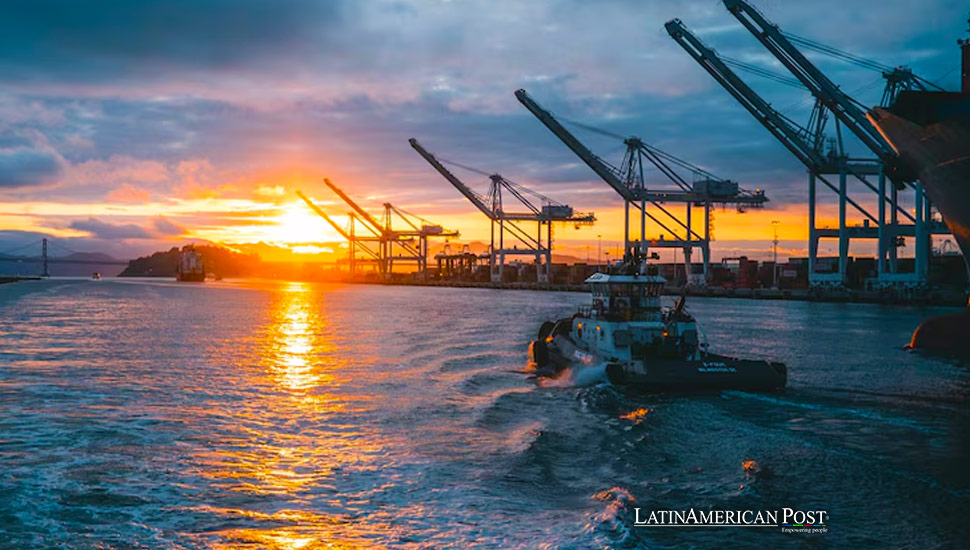Peru and Ecuador Unite Against Crime and Discuss Oil Opportunities

The presidents of Peru and Ecuador pledged to collaborate in combating transnational organized crime and exploring new possibilities for oil processing during a meeting in Lima, marking a significant step in strengthening ties between the neighboring countries.
The presidents of Peru and Ecuador have vowed to collaborate to tackle transnational organized crime and explore new avenues for oil processing. Peruvian President Dina Boluarte announced this Thursday following a meeting with her Ecuadorian counterpart, Daniel Noboa, in Lima. The two leaders signed a joint declaration underscoring their commitment to collaboration on these critical issues.
“We have managed to define commitments with collaborative approaches to confront transnational organized crime,” Boluarte said, highlighting the discussions with Noboa. Both leaders emphasized the importance of cooperation in addressing migration issues and combating illegal mining, two areas significantly impacted by criminal activities.
The agreement between Peru and Ecuador is part of a broader trend in Latin America, where countries increasingly recognize the need for regional cooperation to tackle crime that transcends borders. Transnational organized crime, including drug trafficking, human trafficking, and illegal mining, has posed severe challenges to stability and security in the region.
By working together, Peru and Ecuador aim to enhance their law enforcement capabilities, share intelligence, and coordinate operations to dismantle criminal networks that operate across their borders. This collaborative approach is expected to improve the effectiveness of their efforts and contribute to greater regional security.
Exploring Oil Processing Opportunities
In addition to addressing crime, the leaders discussed the potential for processing Ecuadorian oil in Peru’s Talara refinery. “We have addressed the possibility of processing Ecuadorian oil in the Talara refinery,” Boluarte stated, though she did not provide further details.
The Talara refinery, owned by the state-run Petroperu, is a crucial asset for Peru’s oil industry. However, Petroperu has faced significant financial challenges, including multi-million dollar debts and liquidity issues threatening its operations. The potential collaboration with Ecuador could provide a much-needed boost to the refinery and help stabilize Petroperu’s financial situation.
Ecuador could gain a strategic advantage by utilizing Peru’s refining capacity to process its crude oil, potentially increasing efficiency and profitability. This partnership highlights the mutual benefits that can arise from regional cooperation in the energy sector.
Historical Context and Regional Implications
The meeting between Boluarte and Noboa is set against a long history of cooperation and tension between Peru and Ecuador. The two countries have experienced border conflicts and worked together on various economic and security initiatives. The recent agreement marks a continuation of their efforts to build a more collaborative and stable relationship.
In a broader Latin American context, Peru and Ecuador’s move to strengthen their ties and collaborate on critical issues reflects a growing trend of regional integration. Countries in the region increasingly recognize the benefits of working together to address shared challenges, from economic development to security threats.
The fight against transnational organized crime is particularly relevant in Latin America, where criminal networks often exploit weak borders and limited law enforcement resources to operate across multiple countries. By joining forces, Peru and Ecuador set an example for other nations in the region.
Similarly, the discussions on oil processing underscore the potential for regional cooperation in the energy sector. Latin America is rich in natural resources, and collaborative efforts can help countries maximize the benefits of their resources, improve energy security, and boost economic growth.
Economic and Social Benefits
The joint declaration signed by Boluarte and Noboa also has significant economic and social implications for both countries. Enhanced cooperation on security can lead to safer communities, improved public trust in law enforcement, and a more stable environment for economic activities.
The potential agreement to process Ecuadorian oil in the Talara refinery for Peru could provide a much-needed economic boost. The refinery, which has undergone modernization efforts, can process various types of crude oil and produce higher-quality fuels. By increasing its utilization through partnerships with neighboring countries, Peru can enhance its energy production and improve Petroperu’s financial health.
Ecuador would benefit from increased refining capacity and the ability to export higher-value refined products. This could contribute to greater economic stability and development in the country, supporting its broader goals of growth and modernization.
Future Prospects and Challenges
While Peru’s and Ecuador’s commitments are promising, they also come with challenges. Effective implementation of the agreements will require sustained political will, coordination, and resources. Both countries must address the underlying issues that enable transnational organized crime, such as poverty, corruption, and weak governance structures.
In the energy sector, the success of the oil processing collaboration will depend on the ability of both countries to navigate financial and logistical challenges. Ensuring the viability of the Talara refinery and securing the necessary investments will be crucial for the partnership to succeed.
The broader regional context also presents opportunities and challenges. As Latin American countries continue to explore ways to collaborate on shared challenges, they must balance national interests with the benefits of regional integration. Building trust and effective mechanisms for cooperation will be essential for achieving long-term success.
Also read: Peru’s Telecommunications Boom: From Monopoly to Economic Driver
The meeting between Presidents Dina Boluarte and Daniel Noboa marks a significant step in strengthening the relationship between Peru and Ecuador. Their commitments to combat transnational organized crime and explore oil processing opportunities reflect a broader trend of regional cooperation in Latin America. By working together, the two countries can address shared challenges, enhance their security and economic stability, and set an example for other nations. The success of these initiatives will depend on effective implementation and sustained political will, but the potential benefits for both countries and the region are substantial.




